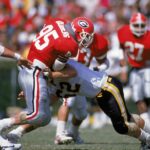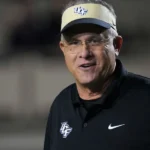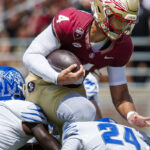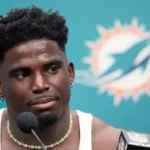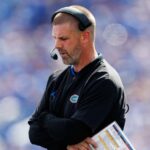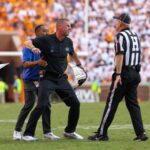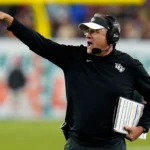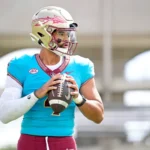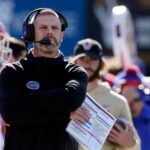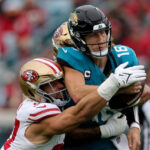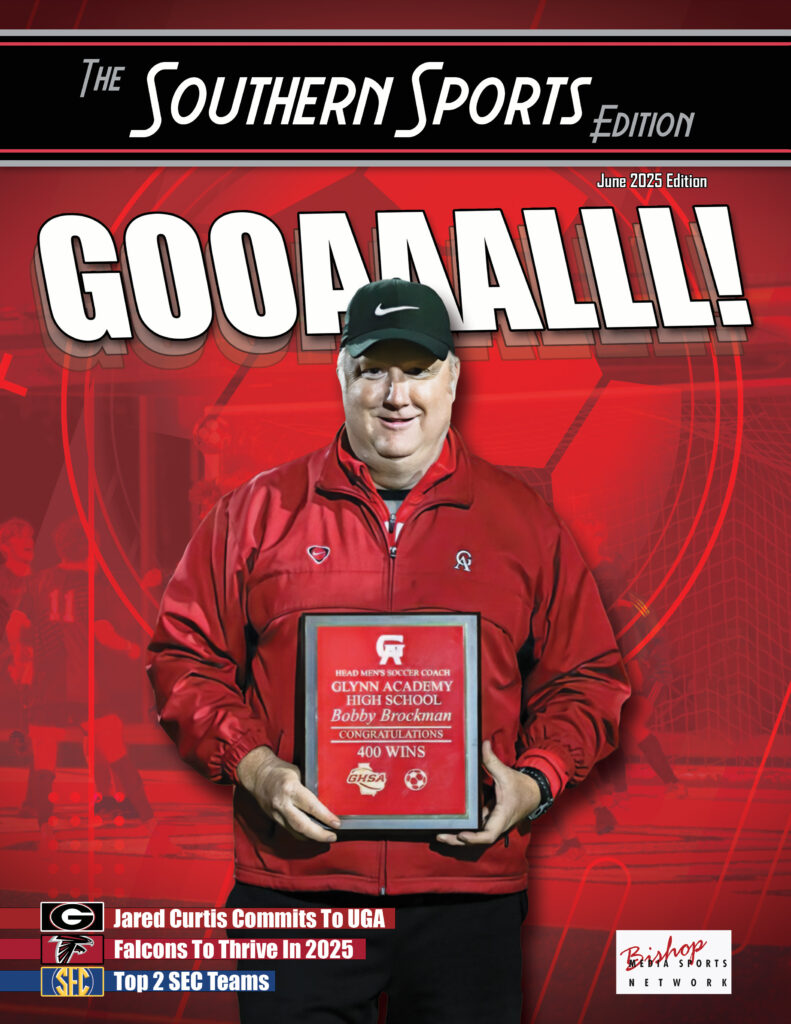Robert Craft
Hall Of Fame
 By: Robert Craft
By: Robert Craft
TheSouthernSportsEdition.com news services
The city of Jacksonville announced on Tuesday that Bill Goldberg, the former University of Georgia defensive tackle who helped the Bulldogs win three of four games against the Gators, will be among the 2024 inductees into the game’s Hall of Fame.
Goldberg will be inducted with Florida cornerback Fred Weary, a Mandarin High graduate, former Jacksonville Jaguars linebacker Mike Peterson, and UGA cornerback Mike Fischer of Jacksonville, a Bolles graduate.
Goldberg was a two-time All-SEC player and lettered four years for the Dawgs from 1986-1989. He’s still ninth in Georgia history with 348 tackles.
But when injuries curtailed his NFL career after stops with the Los Angeles Rams and Atlanta Falcons, Goldberg dropped his first name and became one of the dominant professional wrestlers with a career of more than two decades that culminated with his induction into the WWE Hall of Fame in 2018.
Using moves such as “The Spear” and “The Jackhammer,” Goldberg was a five-time world champion in World Championship Wrestling and World Wrestling Entertainment and at one point was reputed to have gone on a 173-0 streak.
He wrestled competitively off and on from 1997-2018 and also has dabbled in mixed martial arts and acting. He appeared in Adam Sandler’s remake of “The Longest Yard” and was a contestant on “Celebrity Apprentice.”
Fisher, who began his college career at Furman, transferred to Georgia as a walk-on and earned a scholarship in 1978. He played on three Georgia teams that went 3-0 against the Gators from 1978-1980 and had an interception against the Gators in the 1979 and two in 1980.
Fred Weary played for the Gators from 1994-1997 and was on three winning teams against Georgia, including the two games that were played on the campuses in 1994-1995 when UF won by combined scores of 104-31.
Weary had 15 career interceptions to lead Florida, six in his senior season. He was first-team All-SEC.
Weary played six years in the NFL, for New Orleans, Atlanta and the St. Louis Rams. He had seven interceptions as a pro.
Mike Peterson, a Gainesville native who played high school football at Alachua Santa Fe, stayed home to play for the Gators and was on three teams that beat the Bulldogs in four years from 1995-1998. Peterson had 249 tackles in four seasons and also was first-team All-SEC.
Weary and Peterson both started for the Gators’ first national championship team under Steve Spurrier in 1996.
Peterson played in the NFL for 14 years, with Indianapolis, the Jaguars and Atlanta. He had 883 tackles and 19 interceptions. He is currently on the Florida coaching staff.
Blowing Out The Buffs?
 By: Robert Craft
By: Robert Craft
TheSouthernSportsEdition.com news services
When you’re trailing 28-7 early in the third quarter, typically you don’t think running the ball is a recipe for a comeback win. Unless, of course, you’re RJ Harvey.
UCF’s star running back carried his team to a dramatic, 35-34 comeback victory over TCU two Saturdays ago, finishing with 180 rushing yards and two touchdowns on a career-high 29 carries, plus a 29-yard receiving touchdown.
The Knights erased a 21-point deficit in the second half to open their Big 12 play with a win, The Knights are now 3-0.
Harvey went into halftime with a respectable 66 yards on the ground before shredding TCU’s defense after the break, ripping 114 yards,6.3 yards per carry to flip the momentum and score in UCF’s favor.
With a home showdown against Colorado and coach Deion Sanders on Saturday, Harvey finished sixth in FBS with 1,416 rushing yards in 2023, averaging 149.3 yards per game in 2024 (fourth in the country).
What makes UCF particularly dangerous is that Harvey doesn’t have to do it alone. Toledo transfer Peny Boone, Cincinnati transfer Myles Montgomery, and speedy senior Johnny Richardson round out arguably the deepest running back group in college football, with all four averaging at least 6 yards per carry. Add in dual-threat quarterback KJ Jefferson, and the Knights have the top rushing attack in FBS at 375.7 yards per game.
UCF lost five in a row to open league play in 2023, their first season as a member of the Big 12. The challenges of upgrading from the AAC to the Big 12 manifested into several late-game collapses, including: Kansas State, Oklahoma, and a 29-point meltdown against the Baylor Bears. Those Knights didn’t have the horses or swords to keep up.
Coach Malzahn worked to rectify 2023’s roster through the portal, adding 24 transfers this offseason.
“There’s nothing like experience in college football,” Malzahn said. “The more experienced team you have, the better chance you have to be successful. We have a lot of older guys who have played a lot of football.”
That experience showed up on the road against TCU. UCF’s defense tightened up just enough, forcing two punts and three field goals, the last one a desperation 58-yard attempt that sailed wide right as time expired.
Jefferson is still finding his footing with the Knights through three games, but when the team needed him to step up late against TCU, the veteran delivered, including a pair of 20-plus-yard touchdown passes to senior wideout Kobe Hudson.
The bigger issue last season, however, was a defense that wilted against Big 12 competition, particularly against the ground game. UCF allowed 4.9 yards per carry in 2023.
The current three-game sample isn’t enough to get excited about. They were best in the Big 12 with 2.5 yards per carry allowed in 2024, and the additions of players like Pace, Arnold and defensive linemen Nyjalik Kelly and Dayan Dotson have strengthened the defense at all three levels.
Is it improved enough to contend in the newly crowded and chaotic Big 12 race?
UCF gets their next chance to prove something on Saturday against Colorado, fresh off the Buffs’ Hail Mary overtime win against Baylor.
It’s still up for debate how much better this Colorado team is compared to their last place finish in the Pac-12 in 2023, but it boasts two game-changing talents in Shedeur Sanders and Travis Hunter, as well as the Coach Prime effect: Fox’s “Big Noon Kickoff” pregame show is headed to Orlando, Fla., and the game gets the network’s 3:30 p.m. ET national spotlight.
It’s probably the biggest showcase UCF has had since ESPN’s “College GameDay” in Orlando in 2018.
These Knights will face more challenging in-conference tests against Iowa State, BYU, Arizona and Utah later in the schedule, as well as a short trip to Gainesville on Oct. 5 for a non-conference game that could kill Billy Napier’s tenure at Florida.
If UCF truly is good enough to compete for a Big 12 title, it should take care of business at home against a Colorado team that needed a last-second miracle to beat Baylor. The uniqueness of Saturday is an opportunity to burnish those bona fides with plenty of eyeballs watching.
UCF is a young Power 4 team with a lot of growth. Saturday at 4 pm, The Bounce House will be rockin and a large national audience will see UCF. UCF 34 Colorado 23
Sound The Alarm
 By: Robert Craft
By: Robert Craft
TheSouthernSportsEdition.com news services
How does a college football team win 13 games one year and turn into an absolute train wreck the next?
Florida State’s Mike Norvell — who signed an $11 million yearly contract extension in January to —is facing that question.
His Seminoles, picked by the media to repeat as ACC champions, lost to Memphis 20-13, last Saturday to become the ninth preseason AP top-10 team since 1950 to lose its first three games.
If that isn’t embarrassing enough, Norvell left Memphis five years ago to coach for FSU. Now, for the second time, the Seminoles have started a season by losing their first three games.
“I know what it takes to win games,” Norvell said after Memphis outgained the Seminoles 337 yards to 228 inside of Doak Campbell Stadium.
“I know what it takes for a team to go out there and be able to execute and play at a high level. We all have to do a better job of what we’re doing throughout the course of the week and challenge the players, challenge the coaches. Because we can’t continue to come into games and see things that absolutely are not a part of what we are and who we are.”
On one hand, this might be how good Florida State is without Jordan Travis , Keon Coleman, Johnny Wilson, and Trey Benson. A collection of leaders on both sides of the ball for last year’s Florida State team are now NFL players.
It took Travis a couple of years after leaving Louisville to settle into FSU’s leading role at quarterback. He earned the respect of his teammates through the struggles of Norvell’s first two seasons (3-6 and 5-7) before their success in the last two. Those Seminoles, whether brought in through the portal or homegrown, developed into a championship team and enjoyed playing together.
This collection of transfers and homegrown players do not look like they’re having fun, and the culture does not look good.
The offense is just awful. The first half against Memphis was a comedy of errors, and a parody of the program Bobby Bowden built 5000 years ago.
It started with former Alabama running back Roydell Williams fumbling on the second play and ended with freshman Lawayne McCoy muffing a punt after his teammate Quindarrius Jones was blocked into him.
It was one of three turnovers in the half, which included only 67 yards of total offense and three first downs.
You cannot blame Adam Fuller’s defense. The Seminoles have given up 24, 28 and 20 points in three losses.
The majority of the issues are on offense. Is it evaluation? Development? Belief in the system? Things are clearly not trending in the right direction.
Recruiting has been good but never great under Norvell. The 2025 class took several hits in recent weeks when two blue-chip defensive linemen decommitted. There could be more defections if the results on the field don’t improve.
Norvell’s press conference last Saturday ended with a fire alarm going off in the building.
Nobody at FSU is going to fire Norvell anytime soon with the amount of money left on his contract, but it’s fair to sound the alarms about FSU’s future after smelling smoke early on.
Excessive Force?
 By: Robert Craft
By: Robert Craft
TheSouthernSportsEdition.com news services
Dade Police and their conduct was “overly aggressive and violent” during a traffic stop with wide receiver Tyreek Hill on Sunday.
The Miami Dolphins’ statement Monday followed the release of body-camera footage of Hill being forced out of his vehicle and on the ground by police officers. Police stopped Hill minutes away from Hard Rock Stadium.
Hill was en route to the Dolphins’ game against the Jacksonville Jaguars when police pulled him over and ticketed Hill for a traffic violation.
Following the stop, police approached Hill’s car and after a brief interaction, Hill rolled his window up. The police told Hill to keep his window down, and after he did not fully roll it back down, one of the four Miami-Dade police officers opened his car door and pulled him out of the vehicle by the back of his neck. One officer put Hill face-down on the street to handcuff him.
During the detainment, Dolphins defensive tackle Calais Campbell and tight end Jonny Smith drove by and pulled over to the side of the road. Campbell was detained and cited for disobeying a direct order. He saw Hill in handcuffs and said it was “excessive force.”
Dolphins coach Mike McDaniel said in a news conference Monday afternoon that he was “very happy a guy in a situation like that didn’t feel alone.”
“It’s what you hope your team is comprised of,” McDaniel said about Campbell and Smith’s attempt to help Hill. “I’m very proud that they see each other as teammates and hold that in regard the way they do.”
The Dolphins expressed support for their players in their statement Monday while also calling on the MDPD to take action.
Following Hill’s detainment, Miami-Dade Police Department director Stephanie Daniels said in separate statements Sunday that she had requested a review of the incident and that one of the officers involved had been placed on administrative duties amid an investigation.
Following the release of the bodycam footage Monday, Daniels said the police department “is committed to conducting a thorough, objective investigation into this matter, and we will continue to update the public on the outcome of that process.”
Monday, the South Florida Police Benevolent Association, a union for police officers, said it “(stands) with the actions of our officers” involved in the incident:
“We have worked hard across all communities to bridge the gap between what people believe law enforcement should and can do,” the association said in a statement. “While we wait for the investigation to run its course, based on what we know, we stand with the actions of our officers but look forward to further open communication moving forward.”
McDaniel, who spoke Monday before the public release of the bodycam footage, said of Hill’s detainment: “It’s been hard for me not to find myself more upset the more I think about it.Trying to put myself in that emotion or that situation that they described emotionally and then knowing more than that. The thing that f— me up, honestly, to be quite frank, is knowing that I don’t know what that feels like.”
Drain The Swamp?
 By: Robert Craft
By: Robert Craft
TheSouthernSportsEdition.com news services
Billy Napier’s third season at Florida didn’t start well. We’ll wait to see whether he finishes it or not.
It would take the second-biggest buyout of a coach in college football history ($26 million) but Florida’s administration has to ask themselves hard questions after in-state rival Miami thumped them on Saturday in front of 90,000 fans in The Swamp.
Florida hasn’t been patient in the past. Since Urban Meyer resigned at the end of the 2010 season, the Gators have cycled through Will Muschamp (28-21 from 2011-14), Jim McElwain (22-12 from 2015-17) and Napier’s predecessor-Dan Mullen, without blinking.
It’s hard to tell where the Gators have improved since athletic director Scott Stricklin pulled the plug on Mullen with one game to go in 2021. Mullen went 34-15 in his four total seasons coaching the Gators, including 11-2 in 2019. Stricklin told Paul Finebaum this week that he expects Napier to “be at Florida for a long time.”
That could mean several seasons or just one.
The University of Florida has an interim president in charge. Once a new president is hired (which could be a long way off), Stricklin and Napier will very likely be looking for work.
Here’s what we know: The Gators haven’t gotten any better since Napier was hired. They’ve actually gotten worse on defense. Florida is giving up more points than they did under Dan Mullen. Looking back, defense was why Dan Mullen was fired in the first place.
How about the offense? It’s more conservative than Mullen’s, and it also doesn’t score nearly as much. Is there any reason for the program to keep him?
Napier is 11-15 in Gainesville. He has lost six games in a row. Florida has endured three consecutive losing seasons for the first time since the 1940s. On Saturday, it was obvious that the coach developed Miami into a better team in the same time frame that Billy Napier had with the Florida Gators.
“Miami outplayed us. They outcoached us,” Napier said. His team was out-gained 268 yards by the 19th-ranked Hurricanes.
Is it fair to point out that Napier has plenty more resources than his predecessors?
Mullen fought for a new $85 million standalone football facility, and it opened doors when Napier took over. Florida’s support staff under Napier grew by 17 staff members to 62 in total and the assistant coach salary pool has doubled compared to 2021. Not to mention Florida’s NIL efforts have been buttoned up.
So why haven’t the Gators improved? Maybe it’s the way Napier has tried to rebuild his roster over time.
Maybe Napier is a poor game day coach and his offense is lethargic and predictable.
Billie didn’t help himself on Monday, with this quote:
“I think we’ve got to become a more consistent team and we have to execute better. If we can focus on those things and not necessarily what some guy in the basement is saying in rural central Florida on social media, then we got a chance to get better, right? I think that’s the key.”
The Gators play Samford next week before facing Texas A&M.
Odds are pretty good quarterback DJ Lagway will be starting for Graham Mertz next week. He left Saturday’s loss with a concussion.
Lagway could be a special player for the Gators, but the Gators’ issues run much deeper than who is playing quarterback.
I don’t think Napier will change who he is, and he shouldn’t. Off the field he’s thoughtful and intelligent and stoic. He intends to address the media with quotes they want to hear.
I believe Napier has lost support from the masses and Florida fans are turning on him.
Who do you think will be the new president, AD and coach for the 2025 season?
Sunshine State Heat
 By: Robert Craft
By: Robert Craft
TheSouthernSportsEdition.com news services
The University of Florida is set to open their regular season against Miami on Saturday at 3 PM at Ben Hill Griffin Stadium. It is Billy Napier and Mario Cristoball’s third season at their respective programs.
Though it’s just Week 1, there’s a lot on the line for both teams, particularly with their head coaches. Both Billy and Mario have a lot to prove to fans and athletic departments in their third seasons, with losing records.
For Napier and the Gators, wins are scarce this season, as they face the toughest schedule in the country.
For Cristobal and Miami, the competition gets more manageable after Saturday. Neither coach wants to take a loss right off the bat.
Is the Florida defense strong enough to win tough games like this? They started strong last season but crashed soon after.
The Gators should be better this year, but the Hurricanes are far stronger offensively thanks to former Washington State Cougar Cam Ward.
Ward might be the best quarterback transfer in the 2024 cycle. He has all the tools and experience, and he gets the ball out of his hands in a hurry.
In addition, Oregon State running back Damien Martinez should be a star behind an improved Hurricanes offensive line that should dominate the trenches against the rebuilt Gators front.
On the other side of the ball, Miami’s defensive front is undergoing a bit of an overhaul. They have several talented players that might take time to acclimate.
Florida’s offensive line has been an issue over the last few years. Injuries are the Gator’s biggest problem, but their roster has improved through the transfer portal, and the health concerns are okay as of Week 0.
The Hurricane secondary, like the line, will be good, but it’s counting on a slew of transfers to rise up and perform right away.
Florida needs to get QB Graham Mertz going quickly after he completed 73% of his throws for close to 3,000 yards and 20 touchdowns last season.
So, this all comes down to…Which defensive front can be more disruptive?
Miami has the pieces in place to finally win with Mario Cristobal, but The Canes are about to face 2023 Week 3 University of Florida.
That team rose up and rocked defensively in an energy-charged win over Tennessee, and it’s about to happen again in week 1 of 2024.
The Florida defense will hold on in the fourth quarter, and Mertz will be just a bit better than Ward.
Miami is the team playing with more pressure to play well, given the NIL investment that have been made on both sides of the ball.
Florida 31 Miami 27.
This keeps the fans off of Billie‘s back for a few weeks until the gators face Texas A&M at home during week 3.
I think Miami finishes first or second in the ACC and still has a shot at the college football playoffs even with this loss.
Space U
 By: Robert Craft
By: Robert Craft
TheSouthernSportsEdition.com news services
UCF has been a stable competitive team in college football, and a team to never overlook, and that is the case again this season. UCF is projected to be at top of the BIG 12 conference but have some interesting games on the 2024 slate.
Here is a look at my game-by-game predictions for the 2024 Central Florida Knights:
August 29 New Hampshire Wildcats
September 7 Sam Houston Bearkats
2 Cupcake UCF Wins
September 14 at TCU Horned Frogs: We expect the TCU Horned Frogs to be better on offense than they were a season ago. Never easy to go into Fort Worth and win. UCF defense steps up and Knights start 3-0. UCF 31 TCU 27.
September 28 Colorado Buffaloes: The Bounce House will be lit. Coach Prime will watch his Buffaloes melt in the Orlando heat. In a shoot-out, the Knights win. UCF 45 Colorado 38.
October 5 at Florida Gators: Never easy to go to Gainesville and win a game. Florida wants to be better this season, now we will see if that actually comes to fruition. The Gators grab a win. Florida 31 UCF 28.
October 12 Cincinnati Bearcats: The Knights roll and take care of Cincinnati. This is the military appreciation game at the Bounce House and the defense will come to life. UCF 28 Cincinnati 10.
October 19 at Iowa State Cyclones: Iowa State plays a defensive style game here and keeps the Knights from moving the ball too quickly. Iowa State finds a way in late October in Ames. Iowa State 24 UCF 20.
October 26 Brigham Young Cougars: The Cougars are slayed, as UCF gets another in the win column. UCF 38 BYU 17.
November 2 Arizona Wildcats: I think this could be the best game of the season. In a shootout, the Knights win at home. This is a game they really need. UCF 48 Arizona 42.
November 9 at Arizona State Sun Devils: The Knights travel to Tempe and leave with a huge win. The Knights have too much offense and they’ll overwhelm the Sun Devils. UCF 34 Arizona State 16.
November 23 at West Virginia Mountaineers: It could be cold in Morgantown just before Thanksgiving. The rushing attack is strong for the Mountaineers. The Knights run through West Virginia. UCF 24 West Virginia 13.
November 30 Utah Utes: The Utes are projected to be one of the best teams in the BIG 12. This could be game 1 of a 2-game series for a playoff berth. UCF with home field advantage takes game one. The crowd, heat, and rushing attack wear down the Utes. UCF 27 Utah 24.
UCF with 1 BIG 12 loss will be heading to the conference championship game and a game to make the College Football Playoffs.
War Path
 By: Robert Craft
By: Robert Craft
TheSouthernSportsEdition.com news services
Mike Norvell had a busy offseason with the transfer portal. Now that Jordan Travis is in the NFL, Norvell signed DJ Uiagalelei to run the Seminoles’ offense.
Behind Uiagalelei at the helm will be former Alabama running back Roydell Williams, another portal acquisition for the Seminoles.
There has been a lot of action in Tallahassee in 2024 and the season hasn’t started yet. Here’s my game-by-game prediction of Florida State’s 2024 season .
Georgia Tech Yellow Jackets (Aug. 24): Florida State will make the trip to Dublin, Ireland for Week 0, the Seminoles will want to make a statement. I think that Florida State will win this one easily. FSU 38 GT 10.
Boston College Eagles (Sep. 2): Florida State’s home opener will be on a Monday night against Boston College. This will be the Eagles’ first game of the season. Under the new direction of Bill O’Brien, Boston College will likely still be ironing out the details, allowing the Seminoles to cruise into a W. FSU 49 BC 17.
Memphis Tigers (Sep. 14): I think Memphis will have a successful season in the AAC. However, I do not think that the Tigers will be a match for Norvell’s veteran Seminoles. Should be another home win and a 3-game streak. FSU 42 Memphis 21.
California Golden Bears (Sep. 21): This will be Cal’s first season in the ACC. Having to travel cross-country and take on a red-hot Seminoles team might not bode well for the Golden Bears. FSU 27 Cal 10
@ SMU Mustangs (Sep. 28): SMU will be another team that Florida State will introduce to the ACC. The Mustangs are known for their high-powered offense. I think that this one will be a shootout. FSU 45 SMU 41.
Clemson Tigers (Oct. 5): Clemson will be Florida State’s first true test of the season. The Tiger’s are looking to reclaim their dominance in the ACC. Home field advantage will propel the Noles. FSU 30 Clemson 24.
@ Duke Blue Devils (Oct. 18): Duke has spent the last few seasons establishing itself as more than just a basketball school. With that being said, I do not believe Duke will be a match for this year’s Seminoles in Football. FSU 35 Duke 20.
@ Miami Hurricanes (Oct. 26): This will be a road game for FSU, but playing in an NFL stadium that the Hurricanes fail to fill up is not daunting. Florida State should take this one and make it four in a row against an in-state rival. FSU 30 Miami 17.
North Carolina Tar Heels (Nov. 2): Playing this one at Doak Campbell will be a large advantage for the Seminoles, who I think will take this one by a decent margin due to the difference in talent and firepower in the Seminole’s offense. FSU 35 UNC 13.
@ Notre Dame Fighting Irish (Nov. 9): The Fighting Irish are a talented team, and I think playing in South Bend will make this one even harder. I fear that Florida State will keep this one close, but fall at the end. ND 31 FSU 21.
Charleston Southern Buccaneers (Nov. 23): FSU 49 CSU 6.
Florida Gators (Nov. 30): I expect FSU to show out against The Gators. Previous matchups mean nothing in a rivalry game, but I think that the Seminoles make it three in a row in this one. FSU 31 UF 17.
With a healthy roster and no major emergencies for the program, The Seminole should have consistent success and earn themselves a trip to the College Football Playoff.
The Florida Heat
 By: Robert Craft
By: Robert Craft
TheSouthernSportsEdition.com news services
The Florida Gators enter the 2024 season expected to finish 12th out of 16 teams in the SEC, according to their preseason poll.
The expectations for Florida football entering 2024 are not at all high. Billy Napier is heading into his third season as the head coach and Billy is on the hot seat. He has posted a very disappointing 11-14 record across his first two seasons, and Florida will have one of the most brutal schedules and college football in 2024.
Game 1, 8/31. Miami Hurricanes: If you want to talk about the single most important game on the Florida Gator schedule it’s absolutely this game.
The Florida Gators must absolutely win this game to create momentum for 2024. The Miami Hurricanes are a talented team under second year coach Mario Cristobal. The advantage for Florida is The Swamp. Florida Gators 30 Miami Hurricanes 27.
Game 2, 9/7. Samford Bulldogs: This is the one and only cupcake game on the Florida schedule in 2024. Florida 49 Sanford 10.
Game 3, 9/14 Texas A&M: With new coach Mike Elko and a new quarterback on the Aggies roster, expect turn over in this program. Expect even more turnover than Florida’s off-season.
While Texas A&M promises to have plenty of talent. Some of that talent they imported from Gainesville. Can all that talent cohesively come together in time for this game?
Home-field advantage and a returning quarterback will hopefully lead Florida to their third victory of the year. Florida 27 A&M 17.
Game 4, 9/21 @ Mississippi State: This game is tricky. It is on the road, against new head coach Jeff Libby; and Jeff has a lot of work to do.
To start, a new quarterback is needed after Will Rogers went to the transfer portal. The Bulldogs defense also requires roster retooling.
Coach Napier has a horrible road record. At the end of the day, he must prove that he can win on the road this season and this is a convincing opportunity. Florida 28 Mississippi State 17.
Game 5, 10/5 UCF: This is definitely another game that Billy Napier must win to survive. I know Napier has a problem as an endgame coach, but you have to bet on the Home team. UCF will come into this game with a huge chip on their shoulders. It will be way too close. Florida 38 UCF 35.
Game 6, 10/12 @ Tennessee: Josh Heupel knows how to dump points on teams in bunches.
His easy to run, hard to defend offensive system is a concerning combination.
Also, Nico Iamaleava is an upgrade from Joe Milton. The Gator’s defense better be ready. Florida has owned the Vols over the past 20 years, Tennessee won’t go easy on them.
Tennessee 49 Florida 27.
Game 7, 10/19 Kentucky: I can’t believe I’m saying this, but this is the year Florida finally beats Kentucky!
Oh, if only my 2010 self could hear me talk now. Kentucky is going to play big boy football in the trenches, and Billy Napier must address the need of the O- and D-Line to control the line of scrimmage.
Once again, I give Florida a slight nod because they’re playing in the Swamp. Florida 23 Kentucky 20.
Game 8, 11/2 Georgia: November will be the most hellacious month of Florida football in recent memory.
I do not believe Florida has closed the talent gap on Georgia, and this year Georgia will be playing for a top seed in the college football playoffs. Georgia 38 Florida 17.
Game 9, 11/9 @ Texas: The brutal five week stretch to close season continues in Austin, where the Gators will lock horns with Texas for the first time since 1940.
Sounds fun, right? Texas is definitely a more talented team and will also be playing for a playoff spot in 2024. Texas 44 Florida 27.
Game 10, 11/16 LSU: LSU has beaten Florida five in a row.
This game will be close because it’s played in the Swamp, But LSU will pull it out late on a coaching mistake by Billy Napier. LSU 31 Florida 27.
Game 11, 11/23 Ole Miss: Lane Kippen will return to the swamp. This time as head coach of Ole Miss. The fact that Ole Miss gets one more year out of Jackson Dart could go a long way towards deciding this game. Ole Miss 27 Florida 24.
Game 12, 11/30 @FSU: Mike Norville has proven adept at working the transfer portal, so reloading for another great season isn’t out of the realm of possibilities.
It’s a rivalry game, which means that even if there are no other emotional components to this game (like the future of Billy Napier), the Florida Gators will have a puncher’s chance.
With that being said, Billy is a putrid 2-10 on the road. FSU 31 Florida 17.
The Keys To Success?
 By: Robert Craft
By: Robert Craft
TheSouthernSportsEdition.com news services
Despite the disappointing way their 2023 season ended, the Jacksonville Jaguars 100% believe they will be back in the mix for an AFC South championship this season.
After losing five of six games to finish 9-8 and cede the division crown to the Houston Texans (10-7), the Jags knew big changes were needed.
Head coach Doug Pederson hired a new defensive staff, while general manager Trent Baalke targeted veteran leaders from winning franchises in free agency to improve the locker room’s ability to withstand adversity.
Afterward, the Jaguars handed out big-money extensions to a trio of their best players: quarterback Trevor Lawrence, pass rusher Josh Hines-Allen, and (most recently) cornerback Tyson Campbell.
Lawrence played well during the Jags’ 8-3 start to 2023 before he was slowed by a barrage of injuries; including a high ankle sprain, a concussion, and an AC sprain in his right shoulder.
That’s why getting Lawrence healthy and keeping him healthy is No. 1 on the Jags’ list of things to do to improve this season. Everyone knows a healthy Lawrence will go a long way in keeping them in the heat of the playoff race.
“He was in a really good place (before the injuries),” Pederson said. “The injuries did take a toll on him toward the back half of the season. He wasn’t the same quarterback. (In the first half), he was making good decisions. He was taking care of the football. We were helping him as an offense, too. Everybody was involved. One guy can’t do it all, and we don’t ask him to do it all.”
On the other side of the ball, the Jaguars are expected to take a big step forward on defense. After the season, Pederson fired defensive coordinator Mike Caldwell and replaced him with former Atlanta Falcons defensive coordinator Ryan Nielsen; a fiery personality who led an aggressive pass rush with the Falcons and New Orleans Saints.
The Jaguars then hung with the eventual Super Bowl champion Kansas City Chiefs. Lawrence finished seventh in the MVP voting and earned his first Pro Bowl nod.
They also have to be less charitable with the pigskin. The Jaguars’ whopping 30 turnovers last season were the fifth-most in the NFL. They lost the turnover battle nine times during their last four losses, which stings considering they finished a game shy of Houston.
The hope of next year is to heighten the intensity around Hines-Allen, edge rusher Travon Walker and key free-agent pickup, defensive tackle Arik Armstead.
As the team-building process began, they zeroed in on players with proven reputations as leaders who have histories as winners. It led them to guys like Armstead (previously with the San Francisco 49ers, cornerback Darnell Savage (Green Bay Packers), center Mitch Morse and Gabe Davis (Buffalo Bills).
Remember, the Jaguars were 15-5, including the playoffs, from Week 12 in 2022 to Week 12 in 2023. They believe they’re closer to that team than the one that both literally and figuratively limped down the stretch.
If their offseason plan pans out, they might be able to prove that.
